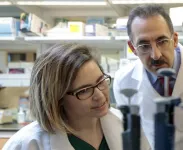(Press-News.org) Seeking to understand why COVID-19 is able to suppress the body's immune response, new research from the USC Leonard Davis School of Gerontology suggests that mitochondria are one of the first lines of defense against COVID-19 and identifies key differences in how SARS-CoV-2, the virus that causes COVID-19, interacts with mitochondrial genes when compared to other viruses.
These differences offer possible explanations as to why older adults and people with metabolic dysfunction have more severe responses to COVID-19 than other individuals, and they also provide a starting point for more targeted experiments that may help identify therapeutics, said senior author Pinchas Cohen, professor of gerontology, medicine and biological sciences and dean of the USC Leonard Davis School.
"If you already have mitochondrial and metabolic dysfunction, then you may, as a result, have a poor first line of defense against COVID-19. Future work should consider mitochondrial biology as a primary target for SARS-CoV-2 and other coronaviruses," he said.
The study, published January 8 in the Nature journal Scientific Reports, expands on recent findings that COVID-19 mutes the body's innate inflammatory response and reports that it seems to be doing so by telling mitochondrial genes what to do.
"We already knew that our immune response was not mounting a successful defense to COVID-19, but we didn't know why," said lead author Brendan Miller, a senior doctoral student in the Cohen Lab at the USC Leonard Davis School. "What we did differently was look at how the virus specifically targets mitochondria, a cellular organelle that is a crucial part of the body's innate immune system and energy production."
Making use of the vast amounts of public data being uploaded in the early days of the virus outbreak, the research team performed RNA sequencing analyses that compared mitochondrial-COVID interactions to those of other viruses: respiratory syncytial virus, seasonal influenza A virus, and human parainfluenza virus 3. These reanalyses identified three ways in which COVID-19, but not the other viruses, mutes the body's cellular protective response.
Chief among their findings is that SARS-CoV-2 uniquely reduces the levels of a group of mitochondrial proteins, known as Complex One, that are encoded by nuclear DNA. It is possible that this effect "quiets" the cell's metabolic output and reactive oxygen species generation, that when functioning correctly, produces an inflammatory response that can kill a virus, they say.
"COVID-19 is telling the cell not to make these Complex One-related proteins. That could be one way the virus continues to propagate," said Miller, who notes that this, along with the study's other observations, still needs to be validated in a targeted experiment.
The study also revealed that SARS-CoV-2 does not change the levels of the messenger protein, MAVS mRNA, that usually tells the cell an attack has happened. Normally, when this protein gets activated, it functions as an alarm system, warning the cell to self-destruct so that the virus cannot replicate, Miller said.
In addition, the researchers found that genes encoded by the mitochondria were not being turned on or off by SARS-CoV-2 - a process that is believed to produce energy that can help the cell evade a virus - at rates to be expected when confronted with a virus.
"This study adds to a growing body of research on mitochondrial-COVID interactions and presents tissue- and cell-specific effects that should be carefully considered in future experiments," said Cohen.
INFORMATION:
Our bodies often dispatch stem cells to mend or replace biological damage, but how these repair agents make their way through dense tissue to arrive at the scene had been a mystery. "How stem cells squeeze through tissue openings a hundred to a thousand times smaller than themselves had been a perplexing question," says Ovijit Chaudhuri, professor of mechanical engineering.
In an article published in the Jan. 8 edition of Science Advances, Chaudhuri and colleagues reveal that stem cells use their nucleus - a large, stiff organelle within the cell - as a means of propulsion.
Their discovery was surprising because scientists had thought cells would have particular ...
(St. Louis) - A new study by investigators at the Shriners Hospital for Children -- St. Louis suggests the damaging effects of obesity are not due to body weight but rather come from something much smaller - biochemical signals released by fat cells.
The study focuses on the link between overweight or obesity and the development of osteoarthritis, a painful disease of the joints. The investigation was led by Dr. Farshid Guilak, director of the St. Louis Shriners Hospital Research Center.
"We've shown here that it's not overloading of the joints that is responsible for osteoarthritis, but, more likely, a factor given off by fat cells that makes cartilage susceptible to degeneration," ...
ATLANTA AND TAMPA, FLA. - JANUARY 11, 2021 - A new study suggests a link between toxoplasma gondii (T. gondii) infection and the risk of glioma, a type of brain cancer, in adults. The report, appearing in the International Journal of Cancer, finds that people who have glioma are more likely to have antibodies to T. gondii (indicating that they have had a previous infection) than a similar group that was cancer free.
For the study, investigators led by James Hodge, JD, MPH and Anna Coghill, PhD examined the association between T. gondii antibodies measured several years before the cancer ...
Scientists at Dana-Farber Cancer Institute and the Centers for Disease Control and Prevention have uncovered new evidence of the potential health risks of chemicals in tobacco and marijuana smoke.
In a study published online today by END ...
Around 1085 AD, along the southern rim of Northern Arizona's elevated Colorado Plateau, a volcano erupted, forever changing ancient Puebloan fortunes and all nearby life. Among the 600 or so volcanoes that dot the landscape of the San Francisco volcanic fields, this one blew. It was the very first (and last) eruption for what came to be known as Sunset Crater, aptly named for its multi-hued, 1,000-foot-tall cinder cone.
Today, ASU School of Earth and Space Exploration scientist Amanda Clarke and her team have been working to solve the mysterious root cause of the Sunset Crater eruption and any lessons learned to better understand the threats similar ...
Fieldwork led by Dr Eleanor Scerri, head of the Pan-African Evolution Research Group at the Max Planck Institute for the Science of Human History in Germany and Dr Khady Niang of the University of Cheikh Anta Diop in Senegal, has documented the youngest known occurrence of the Middle Stone Age. This repertoire of stone flaking methods and the resulting tools includes distinctive ways of producing sharp flakes by carefully preparing nodules of rock, some of which were sometimes further shaped into tool forms known as 'scrapers' and 'points.' Middle Stone Age finds most commonly occur in the African record between around 300 thousand and 30 thousand years ago, after which point ...
Researchers have taken an important step forward in developing a controlled human infection model to test leishmaniasis vaccines.
The University of York-led study identified and characterised a new strain of Leishmania parasite that will form the basis of a new controlled human infection model for the disease which is transmitted by the bite of sand flies. The team then produced the parasite to the standards required for use in human clinical studies.
The use of controlled human infection models has already proved invaluable in accelerating vaccine development for cholera, malaria, typhoid, ...
Conditions are ripe for transforming the U.S. mental health care system, with scientific advances, the growth of Medicaid and political consensus on the importance of improving mental health creating the possibility that goals once thought out of reach may be possible, according to a new RAND Corporation study.
Broad changes will be needed to improve how Americans receive mental health care, such as integrating behavioral health care into general health care settings, providing supportive housing to the homeless and promoting comprehensive mental health education.
Federal mental health parity legislation is one recent promising development that aims to put ...
Human papillomavirus (HPV) can infect the mouth and throat to cause cancers of the oropharynx. A new study published early online in END ...
Canada must dismantle anti-Black racism in health care to address its harmful effects on people's health, argue authors of a commentary in CMAJ (Canadian Medical Association Journal)
http://www.cmaj.ca/lookup/doi/10.1503/cmaj.201579
Racism has significant negative effects on the physical and mental health of Black people and people of nondominant racial groups. For example, there have been significantly higher death rates from COVID-19 among Black people in North America and the United Kingdom. Anti-Black racism also exists in the medical system, with stereotyping and bias by health care providers and an underrepresentation of Black physicians.
"First, we who work in health care must acknowledge the existence of anti-Black racism in ...





